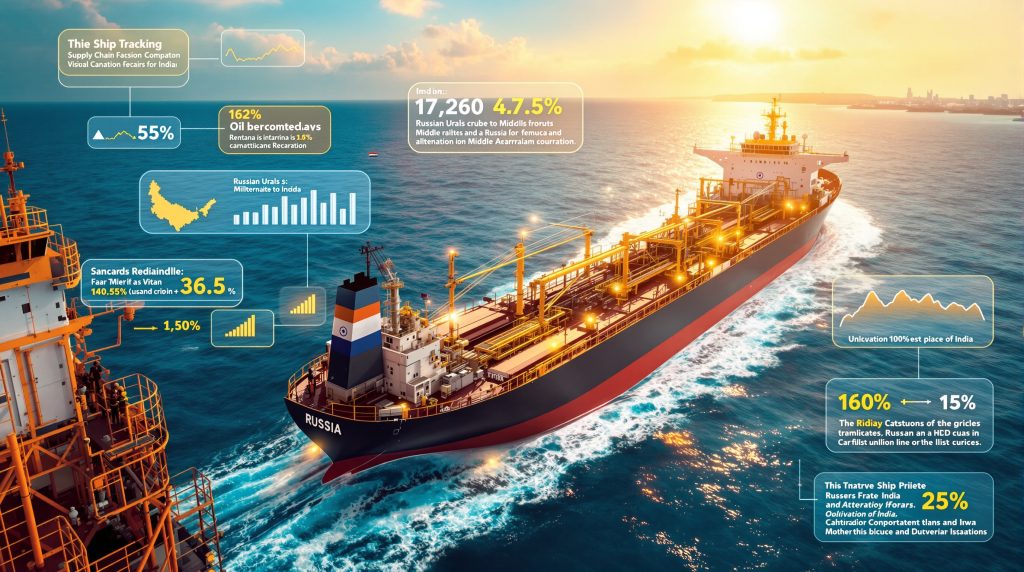The global energy landscape faces unprecedented disruption as U.S. sanctions on Russia lead to puzzling oil cargo transfer off India, creating complex maritime operations that challenge traditional supply chain frameworks. These developments represent a significant shift in how international energy markets navigate geopolitical restrictions and regulatory compliance requirements.
Maritime Operations Under Sanctions Pressure
When sanctions target major oil exporters, the maritime industry responds through sophisticated ship-to-ship transfer operations. These procedures involve technical complexity and regulatory navigation that extends far beyond simple cargo movement between vessels.
The effectiveness of such operations depends on multiple factors. Weather conditions must remain stable for safe vessel positioning. Furthermore, specialized equipment including transfer hoses and pumping systems requires experienced crew coordination across both donor and receiving vessels.
Legal frameworks governing these operations create additional complexity. Under the United Nations Convention on the Law of the Sea (UNCLOS), vessels operating beyond 12 nautical miles from coastlines fall under different jurisdictional authorities than those in territorial waters.
"The complexity of maritime law creates ambiguous enforcement zones where flag state authority, coastal state regulations, and international sanctions regimes intersect," according to maritime legal experts.
India's Strategic Position in Global Oil Markets
India's petroleum import requirements exceed 200 million tonnes annually, making it one of the world's largest energy importers. The country's refining landscape includes both state-owned enterprises and private facilities, each implementing different supply strategies during market disruptions.
Major Indian refining entities demonstrate varied approaches to supply security:
- Indian Oil Corporation: 70+ million tonnes capacity focused on energy security
- Reliance Industries: 65+ million tonnes with export optimization strategies
- Bharat Petroleum: 35+ million tonnes prioritizing domestic supply
- Nayara Energy: 20+ million tonnes targeting regional markets
When traditional supply chains face disruption, refiners implement geographic diversification across Middle Eastern, African, and American suppliers. Additionally, contract flexibility allows for grade substitutions and delivery modifications that maintain operational continuity.
The oil price stagnation phenomenon often emerges during such supply disruptions. However, premium crude grades can cost $3-8 per barrel more than discounted alternatives, creating significant economic pressures for importing nations.
Sanctions Enforcement and Maritime Compliance
International sanctions create extensive due diligence obligations for companies operating in global energy markets. Enhanced screening procedures require real-time sanctions list monitoring across multiple jurisdictions and vessel tracking systems for cargo origin verification.
Documentation standards have become increasingly stringent. Companies must maintain chain of custody records for petroleum products, verify insurance policy coverage for sanctioned cargo, and prepare legal opinions for complex transaction structures.
The oil price movements during sanctions periods reflect these compliance challenges. Risk assessment protocols evaluate jurisdictional exposure across operational territories, reputational risks from sanctions violations, and potential financial penalties under various regulatory frameworks.
Financial System Adaptations
Energy sanctions create ripple effects throughout global financial networks. Banking sector adjustments include enhanced due diligence procedures for energy-related transactions and correspondent banking relationship modifications that affect trade finance availability.
Insurance markets respond through premium increases for high-risk maritime operations. Coverage exclusions for sanctioned cargo shipments become standard, whilst policy modification requirements ensure compliance assurance across reinsurance markets.
The tariffs' economic impact intersects with sanctions enforcement mechanisms. Companies must navigate both trade policy restrictions and financial system limitations when developing alternative supply arrangements.
Technology Integration and Innovation
Sanctions regimes accelerate technological development in affected industries. Maritime technology advancement includes satellite tracking systems for enhanced cargo monitoring and blockchain documentation for supply chain transparency.
Automated compliance screening reduces manual oversight requirements whilst alternative fuel development decreases petroleum dependency. Financial technology innovation encompasses digital payment platforms that bypass traditional banking networks and cryptocurrency utilization for sanctions-resistant transactions.
Smart contract implementation enables automated compliance verification. Cross-border payment alternatives reduce reliance on established systems that may face regulatory restrictions during sanctions periods.
Regional Market Response Patterns
Different geographic regions exhibit distinct adaptation strategies when facing energy supply disruptions. Asian markets demonstrate high import dependency that creates vulnerability to supply shocks, yet diverse supplier relationships enable rapid substitution capabilities.
Government intervention through strategic reserve releases provides market stabilization. Price subsidy mechanisms protect domestic consumers from immediate cost impacts whilst refiners optimize operations for different crude grades.
European adaptation strategies emphasize accelerated renewable deployment and LNG infrastructure expansion. Energy efficiency improvements decrease overall demand whilst regional cooperation enhancement occurs through shared storage facilities.
The tariffs and investments relationship becomes particularly relevant during these market adaptations. Investment flows redirect toward compliant markets and sanctions-resistant infrastructure development.
What Are the Long-Term Market Implications?
Comprehensive sanctions programs create permanent changes in global energy trade patterns. Infrastructure investment shifts require multi-billion dollar commitments for alternative supply route development and refinery configuration changes to process different crude grades.
Strategic reserve capacity expansion enhances supply security whilst renewable energy acceleration reduces import dependency. Relationship structure evolution favours bilateral energy partnerships over multilateral arrangements and long-term contracts over spot market transactions.
Technology sharing restrictions affect industrial cooperation. Financial system fragmentation creates parallel payment networks that operate independently of traditional banking infrastructure.
Environmental and Sustainability Considerations
Energy trade disruptions accelerate environmental policy implementation and clean energy adoption. Renewable energy acceleration includes increased solar and wind deployment rates during supply uncertainty periods.
Energy storage investments support grid stability whilst electric vehicle adoption reduces petroleum demand. Industrial process electrification decreases fossil fuel dependency across manufacturing sectors.
Carbon market implications include emission reduction incentives through higher fossil fuel costs. Green financing expansion supports sustainable infrastructure development whilst ESG investment criteria modifications reflect geopolitical risks.
Market Psychology and Investment Behavior
Energy sanctions create complex psychological dynamics affecting investor decision-making. Risk premium calculations incorporate geopolitical risk assessment more prominently in energy valuations whilst supply security concerns drive strategic investment decisions.
Volatility expectations increase across energy commodity markets. Portfolio diversification strategies emphasize geographic spread to mitigate concentration risks in sanctioned jurisdictions.
Investment flow redirections include capital flight from sanctioned jurisdictions and alternative investment opportunities in compliant markets. Infrastructure development funding shifts toward secure supply routes whilst technology investment increases in sanctions-resistant sectors.
The U.S. economy and tariffs relationship demonstrates how domestic economic policies interact with international sanctions enforcement mechanisms.
Regulatory Evolution and International Coordination
Complex sanctions regimes drive evolution in international regulatory frameworks. Multilateral coordination challenges include enforcement consistency across different jurisdictions and information sharing protocols between regulatory authorities.
Legal framework harmonization reduces compliance complexity whilst dispute resolution mechanisms address cross-border enforcement conflicts. Regulatory technology development encompasses automated monitoring systems for sanctions compliance and data sharing platforms between government agencies.
Machine learning applications enable pattern recognition whilst real-time enforcement capabilities reduce response delays. These technological advances support more effective sanctions implementation and compliance monitoring.
Future Market Structure Considerations
Supply chain resilience building requires redundant infrastructure development ensuring alternative pathways. Strategic partnership diversification reduces single-source dependencies whilst crisis response capability enhancement occurs through coordinated planning.
Technology integration improves supply chain visibility and control. Geopolitical realignment indicators include alliance structure evolution based on energy security priorities and trade relationship reconfiguration reflecting new supply patterns.
International institution adaptation addresses multipolar energy governance whilst conflict resolution mechanisms develop for energy disputes. These structural changes represent fundamental shifts in how global energy markets operate under geopolitical pressure.
Understanding these complex dynamics requires comprehensive analysis of interconnected factors. Key learning areas encompass legal framework complexity across multiple jurisdictions, technical operational requirements for alternative supply arrangements, and financial system interdependencies creating cascading effects.
Risk management principles include scenario planning for multiple potential outcomes and stakeholder engagement across governmental and commercial entities. Compliance system development ensures regulatory adherence whilst contingency resource allocation supports crisis response capabilities.
Recent developments demonstrate how U.S. sanctions affect Russian oil shipments through complex maritime operations. Furthermore, Reuters reports on Russian oil trade challenges highlighting the operational difficulties faced by energy companies navigating sanctions regimes.
These maritime operations represent a fundamental shift in how global energy markets adapt to geopolitical pressures whilst maintaining operational continuity.
Want to Identify Energy Market Opportunities Before Others?
Discovery Alert's proprietary Discovery IQ model delivers instant notifications on significant ASX mineral discoveries, helping subscribers capitalise on market volatility and energy sector developments ahead of the broader market. Explore how major discoveries have generated exceptional returns by visiting Discovery Alert's dedicated discoveries page and begin your 30-day free trial today to secure your competitive advantage.




